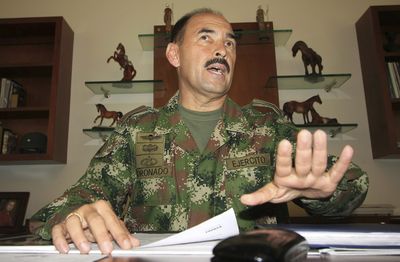Colombian officers fired over killings
President condemns ‘murder of innocents’

BOGOTA, Colombia – President Alvaro Uribe fired 20 army officers, including three generals and four colonels, on Wednesday for neglect that allowed the killing of civilians to inflate rebel casualty counts.
A three-week probe determined that the officers, including two division and three brigade commanders, permitted soldiers to conspire with criminals in what Uribe called “the murder of innocents.”
The biggest shakeup in years for Colombia’s U.S.-backed military, Wednesday’s purge further complicates Bush administration efforts to force a U.S. congressional vote on a free-trade agreement with Colombia.
U.S. Democrats who have stalled such a vote have cited Colombia’s checkered human rights record, which includes the killings of union organizers, the military’s past collaboration with far-right militias and the May 2006 slaying of 10 elite antidrug police by soldiers suspected of working for a drug lord.
The shakeup also comes as prosecutors investigate a rise in alleged army killings of noncombatants with the aim of exaggerating unit performance against leftist rebels.
Armed forces chief Gen. Freddy Padilla read the names of the fired soldiers – 27, including noncommissioned officers – at a news conference with Uribe and Defense Minister Juan Manuel Santos. They said the cases would be turned over to civilian prosecutors, but offered no details of alleged crimes.
Uribe ordered the investigation after a public uproar over the deaths of 11 men who disappeared from the poor Bogota suburb of Soacha this year and whose bodies were later found in common graves in a northeastern combat zone.
“Innocent people in urban slums were apparently tricked, abducted and killed” in “a gruesome trafficking in cadavers,” said Colombia analyst Adam Isacson of the Washington-based Center for International Policy.
Human rights groups have long condemned a rise in extra-judicial killings that followed Uribe’s 2003 peace pact with far-right militias, who had previously committed the bulk of killings of alleged guerrilla sympathizers.
Last month, the AP obtained a report from the chief prosecutor’s office that said 803 armed forces members – including 99 officers – were under investigation in such killings.
More than 200 extra-judicial killings were reported in 2007, Human Rights Watch investigator Maria McFarland said Wednesday, but “until now, President Uribe has consistently denied the existence of a problem.”
Opposition Sen. Gustavo Petro said Uribe should have long ago insisted the military change its policy of promoting officers who produced the highest body counts.
“No one is going to resuscitate the hundreds of thousands of citizens assassinated by the state itself,” he said.
One of the sacked generals, 30th Brigade commander Paulino Coronado, said after nine of the Soacha men’s bodies were found that they died during combat with rebels and right-wing militias.
On Wednesday, he told the AP he never ordered any of his men to commit any crimes: “I didn’t order, I didn’t know of or allow – not even by omission – any illegal activity.”